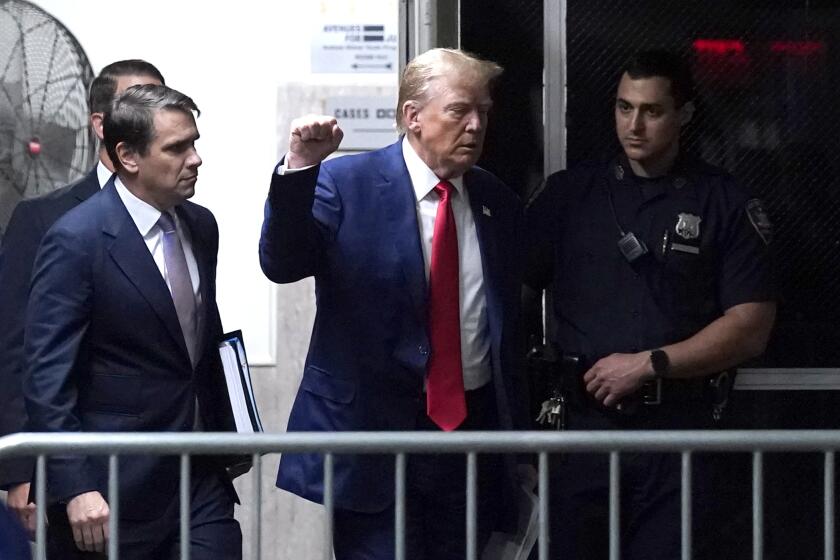Amid Prosperity, Many Kinds of Poverty
My nearly 2-year-old son puts his hand on my cheek and turns my head toward him when he thinks I’m not paying close enough attention to him. It’s his way of getting me to focus. That’s what we need to do now--focus on the relationships, values and commitments that give our lives coherence and purpose.
From the podiums of Philadelphia and Los Angeles, we hear both parties chanting the mantra, “leave no child behind.” It’s time for that oft-repeated promise to be kept.
But first we must face the fact that what’s happening in the streets of America is connected to what’s happening in the hearts of Americans. Our culture of prosperity is covering up three interrelated kinds of poverty--material, spiritual and civic--that grip our society.
Regarding the first, the greatest moral question in American politics today is, what is our prosperity for? Will it serve as an excuse to forget those left behind? Or will it include those who have fallen through the cracks in our society, including almost 14 million children?
The question is unanswered, but both party conventions have at least acknowledged that poverty continues side by side with prosperity. The biblical prophets say that a society’s integrity is judged not by its wealth and power, but by how it treats its most vulnerable members. When one in five American children--and one in three children of color--are still poor, the moral underpinnings of our unprecedented prosperity are in great disarray.
The post-World War II prosperity benefited most American families. But the prosperity of the 1990s has sent a financial windfall straight to the very top. The rising tide has lifted all yachts, but not yet all boats. It is time to assemble our best ideas and practices to address and solve the problems of this material poverty that affects so many in our country. That will require the insights and energies of both liberals and conservatives, and the formation of new partnerships between government, the private sector and the civil society--including faith-based organizations.
But addressing this material poverty is not enough. We also must address another kind of poverty--the spiritual poverty that comes as the result of our society’s anxious striving after affluence. It is the great myth of modern advertising that mere prosperity can give us happy, fulfilled and purposeful lives. But shopping can’t satisfy the deepest longings of the human heart. The market fuels a relentless cycle of working in order to buy more things, which takes precious time away from family and community and thus threatens our moral balance.
One need only look at the front pages of our newspapers. Many of the school shooting sprees that have shocked the nation were carried out by middle-class white kids from two-parent homes. Listening to them talk, you discover that something has gone terribly wrong in their value systems. Affluence helps to mask moral and spiritual poverty.
There also is a third kind of poverty in our political life, a civic poverty. Widespread cynicism about politics, the alarming decline of voter turn-out, the increasing control of our political system by moneyed elites and the coarsening of our public debate can be best understood as aspects of this civic poverty.
Money so controls the political process that it is no longer hyperbole to say that politicians’ votes are up for sale. Campaign contributions have become the quid pro quo in politics.
The conventions this summer vividly dramatize this. Witness the lavish, corporately funded parties in Philadelphia and Los Angeles. As “Granny D”--the 90-year-old great-grandmother who walked across the country for campaign finance reform--says, it’s not just a matter of corrupt politicians but a system of money corrupting politics that ensnares almost everyone. The search for bipartisan solutions to problems is being drowned in a flood of money, and the great casualty of this is the very soul of democracy.
These aspects of poverty--of economic well-being, of the human spirit and of our civic life--affect the future of America, but there is hope. When I ask students why they spend far more time in volunteer service projects than would be necessary for a balanced resume, they tell me they are looking for “meaning” and “connection.” Our youth are right in sensing that service for social justice is key to overcoming our collective poverty of mind, body and spirit.
Also, inspired by the civil rights movement, a new generation of activists is targeting the excessive influence of money in politics. They’re building a grass-roots and morally based political reform movement, and linking it with the growing campaigns for economic justice. Only a values-based politics can overcome our many states of material, spiritual and civic poverty. This requires a transition from rhetoric that blames to solutions that heal. It requires implementing real answers, not just finding more ways to argue over the questions. Values-based politics does not ask what is liberal or conservative but, rather, what is right and what works. This requires communal soul-searching, because the problems of prosperity are not just material and political, but also spiritual.
One good sign is that many voices are now calling for a renewed commitment to the common good over the bottom line, and an ethic of both personal and social responsibility. Many are finding that engagement in their communities provides practical solutions toward overcoming poverty, leads to greater personal satisfaction and creates the rebirth of a vibrant citizen politics. These are the ingredients for reawakening genuine democracy.
More to Read
Get the L.A. Times Politics newsletter
Deeply reported insights into legislation, politics and policy from Sacramento, Washington and beyond. In your inbox three times per week.
You may occasionally receive promotional content from the Los Angeles Times.






